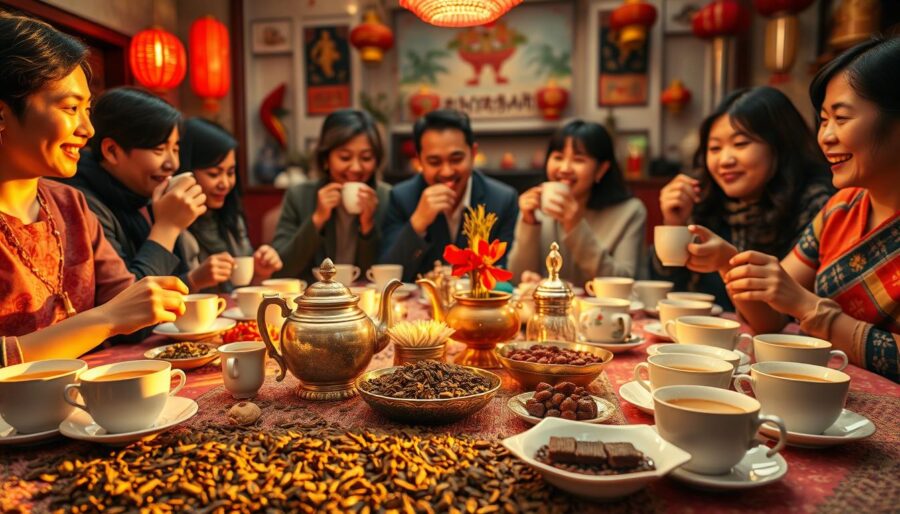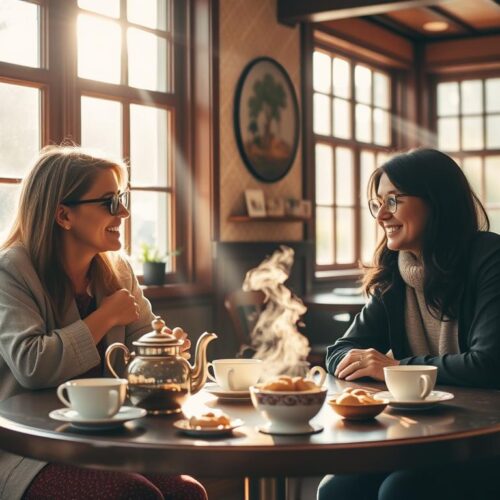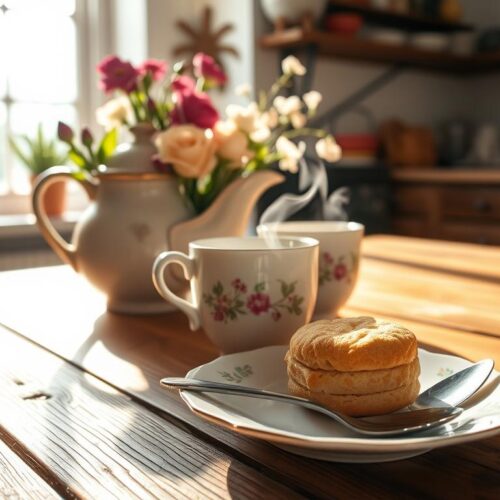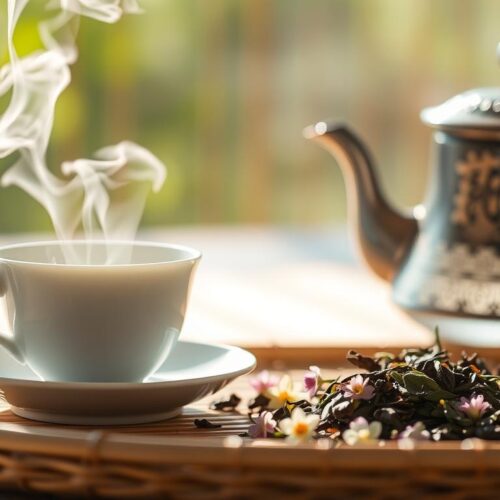Tea symbolizes hospitality and unity, crossing numerous cultures. In exploring its role in celebrations, we see it’s more than a mere drink. It’s integral to cultural rituals, marking events like weddings and births.
The rise of tea ceremonies shows how they deepen connections during shared times. At both simple gatherings and grand wedding feasts, tea’s importance shines, making every moment special for attendees.
The Historical Significance of Tea in Various Cultures
Tea started in ancient China, first used for its health benefits. Through years, its story mingled with society and customs. Now, tea isn’t just a drink. It’s key to social life, rituals, and welcoming guests across cultures.
In China, tea isn’t just a drink; it’s a necessity of life. Enjoying tea is about respect and togetherness. It comes with special ceremonies. When looking into tea cultures worldwide, you’ll see each has its twist but keeps a common respect for tea.
Japan treats its tea ceremony as more than a drink. It’s about meditation, harmony, and honoring tradition. In the UK, having tea in the afternoon is a chance to relax and be with friends. It shows tea’s journey, adapting to new societies while keeping its deep meaning everywhere.
| Region | Tea Culture | Historical Significance |
|---|---|---|
| China | Traditional Tea Drinking | Symbol of hospitality, part of daily life |
| Japan | Tea Ceremony | Spiritual and cultural ritual focused on respect |
| United Kingdom | Afternoon Tea | Social gathering and leisure activity |
| India | Chai Culture | People’s drink that fosters community interactions |
Exploring tea traditions shows its vast influence. Tea connects people across different times and places. It highlights how important and central it is to bringing people together.
Types of Tea Commonly Used in Celebrations
Tea is a crucial part of celebrations worldwide. Getting to know the different teas can make you value their cultural impact more. In celebrations, teas of various flavors and making styles are used. They symbolize joy and unity. Here’s a look at some teas you might see:
- Green Tea: Famous for its health perks, green tea is a favorite, especially in Asian traditions. It symbolizes prosperity and health.
- Black Tea: Rich in flavor, black tea is often found at group events. It stands for strength and friendship.
- Herbal Teas: Not true teas, but herbal options like chamomile and peppermint promote calm and awareness. They fit well in celebrations that emphasize wellness.
- Pu-erh Tea: A fermented Chinese tea, pu-erh is known for its distinctive taste and health advantages. It fosters social connections at gatherings.
These ceremonial teas come with special ways of making them that add to their importance in celebrations. The skill in tea pouring and the special cups used add depth to the celebration. This makes tea a key part of festive moments.
Tea as a Central Element in Wedding Ceremonies
In many cultures, especially in Chinese traditions, the wedding tea ceremony is very important. It shows respect and thanks to family and ancestors. This creates a strong bond among everyone there. The couple serves tea to their elders, showing honor and promising to keep the family together.
Tea traditions differ in weddings, but they all focus on family ties. Certain teas are picked for their hopeful meanings, like peace and wealth. Learning about these tea rituals helps us see how couples value their roots in their weddings.
These tea ceremonies make a cozy place for families to unite. They share good wishes, special moments, and advice for the couple. Looking into tea’s role in weddings shows how it brings families closer, linking past and future.
The Role of Tea in Birth Celebrations
Tea is very special in many cultures when celebrating a birth. It shows the importance of nourishment and connection. Serving tea, particularly medicinal types, is crucial for new moms. These actions are deeply rooted in culture, showing the power of tea in creating family and community support.
When a baby arrives, tea rituals are a big part of the celebration. Friends and family come together to celebrate the baby and the parents. Some teas are meant to bring health to the mother and joy to the baby. These traditions help strengthen the family’s support network during big changes.
| Culture | Type of Tea | Significance |
|---|---|---|
| Chinese | Red Date Tea | Promotes blood circulation and helps in recovery |
| Japanese | Matcha | Symbolizes spiritual connection and offers calm |
| Indian | Masala Chai | Represents warmth and family unity |
| Mexican | Pineapple Tea | Believed to bring good fortune to the newborn |
Tea keeps playing a big role in new life celebrations across cultures. The shared flavors and made memories build a strong community. They ensure that love and support values are handed down through generations.
Tea and Cultural Festivals
Tea cultural festivals are a lively way to celebrate this much-loved drink. They show its importance in many traditions. Events like the Chinese Lantern Festival put tea front and center, with tasty food too. These festivals happen worldwide, highlighting local traditions and offering a deep dive into history.
What’s really special about these tea events is how they bring people together. Everyone gets to try different teas, learn where they come from, and see how they’re made. It’s a way for folks to connect across different cultures, with tea as the thing that brings them together.
Tea festivals also have workshops, tastings, and even competitions. These activities let people learn more and really appreciate tea. From old ceremonies to new ways of presenting tea, each festival shows how important tea is culturally.
Afternoon Tea Traditions: A Timeless Celebration
Afternoon tea is a cherished tradition in Britain, offering a lovely break in the day. Starting in the 19th century, it’s both a time to eat and a social event. Friends and family gather to enjoy teas, finger sandwiches, scones, and pastries in an elegant setting.
Over the years, afternoon tea has reflected social changes. It began as a small meal to curb hunger. Soon, it became a fancy affair for the British upper class. Now, it keeps its charm in modern times, with many places keeping the original feel alive. They do this through special menus and beautiful setups.
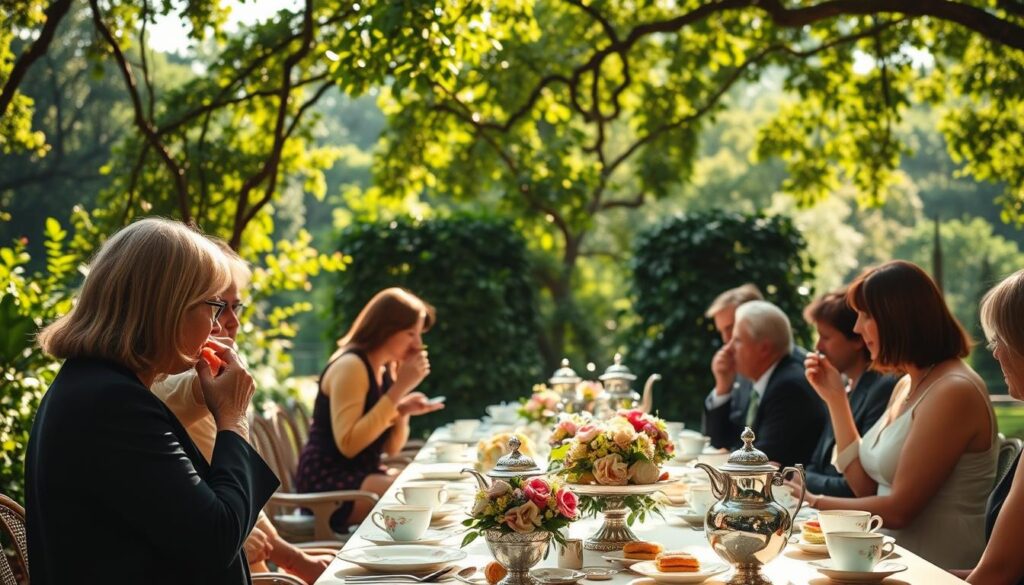
Joining in this tradition means connecting with others and feeling thankful. Afternoon tea brings people together to enjoy life’s simple moments. No matter where it’s held, its joy remains a key part of British culture.
| Afternoon Tea Components | Description |
|---|---|
| Tea | Usually black or green varieties, served hot, sometimes accompanied by milk or lemon. |
| Finger Sandwiches | Typically filled with cucumber, egg, or smoked salmon, these sandwiches are crustless and cut into small portions. |
| Scones | Served warm, often topped with clotted cream and jam, scones are a quintessential part of the experience. |
| Pastries | A selection of cakes and pastries, such as éclairs, tarts, and biscuits, add sweetness to the afternoon. |
Tea and Family Gatherings
Family tea times are more than just sipping tea; they bring us together. Tea has a special way of making ordinary moments special across different cultures. By inviting family over for tea, we create a cozy, welcoming space that strengthens our bonds.
In every culture, tea gatherings have their unique traditions. Some see offering tea as a sign of hospitality, others as respect. But all share one thing: tea brings us together, making it easier for families to talk and bond.
Whether it’s a laid-back brunch or a big holiday party, tea reminds us to enjoy being together. Brewing and sharing tea leads to stories and laughter, making our family ties stronger.
Here are some popular types of gatherings with tea across different cultures:
| Culture | Type of Gathering | Special Tea |
|---|---|---|
| Chinese | Tea Ceremony | Pu-erh |
| British | Afternoon Tea | English Breakfast |
| Japanese | Chanoyu | Matcha |
| Moroccan | Mint Tea Ceremony | Mint Tea |
Having tea at family gatherings makes us closer. It opens up chances for deep talks and building stronger relationships. These moments show tea’s magic in bringing people together, anywhere and anytime.
The Use of Tea in Holiday Celebrations
Tea is important in holiday celebrations worldwide. Different cultures have holiday tea traditions to boost the festive mood. For example, auspicious teas during the Lunar New Year stand for luck and bring people closer.
Every region has its own traditional tea, each with a story. In China, Oolong or Pu-erh tea is popular for health and wealth. The UK enjoys spiced teas during the holidays, making family times more special.
Custom tea ceremonies are a key part of many holiday gatherings. They let you enjoy tea, share tales, or play games together. This shows how joy and connection are at the heart of these celebrations.
| Holiday | Tea Type | Significance |
|---|---|---|
| Lunar New Year | Oolong | Symbolizes good fortune |
| Christmas | Spiced Chai | Enhances festive meals |
| Diwali | Masala Tea | Represents warmth and hospitality |
| Thanksgiving | Pumpkin Spice Tea | Celebrates seasonal flavors |
Tea in holidays is about more than tradition. It’s about making lasting memories with those we love.
Incorporating Tea into Personal Celebrations
Tea has a special way of making your personal celebrations better. Whether it’s a birthday, anniversary, or a special milestone. It brings a warm and welcoming feel, making guests feel connected. You can make the tea celebration fit your own style and likes.
Here are some fun tea-themed ideas for your next event:
- Create a themed tea party. Pick a color scheme or topic that fits the event well, and choose teas that match.
- Develop personalized tea blends. Have a variety of teas and infusions so guests can create their special mix.
- Host an afternoon tea with a twist. Serve teas with sweet and savory snacks, making every moment enjoyable.
- Integrate tea into your décor. Use teacups and teapots as centerpieces or party favors to add a cute touch.
- Facilitate a tea tasting experience. Choose different tea flavors for guests to try, helping them discover new favorites.
Having a tea-focused event can turn it into something unforgettable. Let your imagination run wild, making sure every detail shows the happiness of the occasion. Tea at events creates a thoughtful and friendly mood, bringing people closer together.
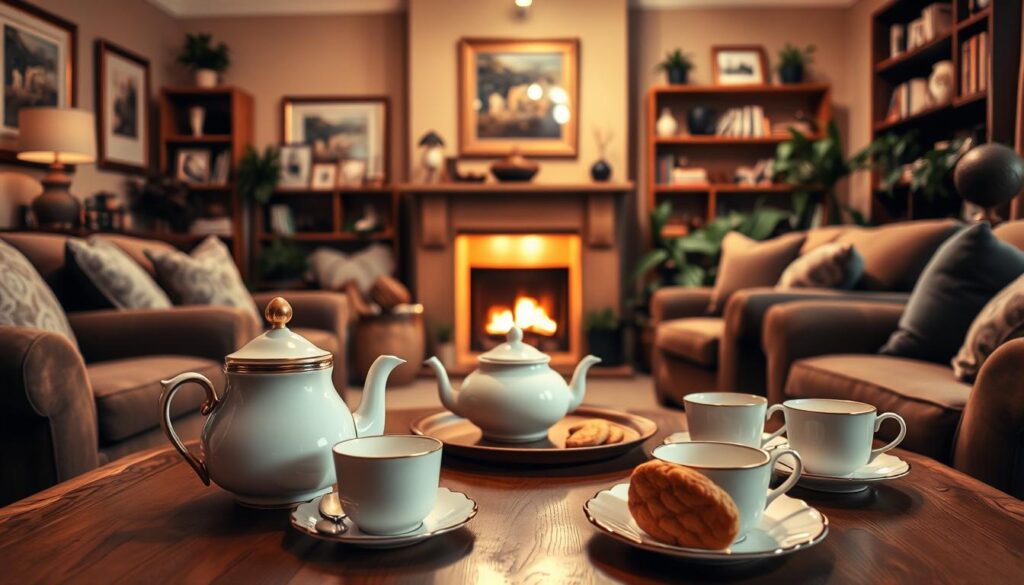
Tea Gifts for Celebratory Moments
Gifting tea makes any special occasion even better. Luxurious loose leaf teas and personalized sets deepen connections at celebrations. Every type of tea tells a story through its flavors and memories.
Choose tea based on what the person likes. They might like soft white tea or strong black tea, or even a unique herbal mix. Picking the perfect tea shows you really thought about them.
Tea gifts can make birthdays, anniversaries, or big achievements more special. A carefully chosen tea set can surprise and delight, bringing people together. Writing a personal note with your tea gift makes it extra special.
Here are some options to consider:
- Custom tea blends reflecting unique flavors
- High-quality loose leaf teas paired with a stylish infuser
- Elegant teapots or teacups as part of the gift set
- Tea subscription boxes for ongoing enjoyment
Tea gifts fit many occasions and show how much you value the relationship and shared moments. Whatever you’re celebrating, a thoughtful tea gift is always remembered.
Conclusion: Embracing Tea in Your Celebrations
Tea is a key player in global celebrations, helping bring people together. From Japan’s elaborate ceremonies to British afternoon teas, sharing tea can strengthen bonds. It makes joyful times even more special.
Adding tea to your events respects old traditions and sparks new joy and memories. It shows the value of hospitality and togetherness that tea represents. This makes every occasion with tea a celebration of connection.
So, think of tea when you’re planning a party. It connects us with the world and each other, adding depth to any event. Sharing tea tells a story, both personal and shared, making every gathering unforgettable.

